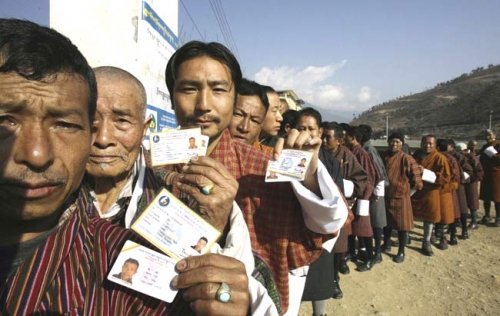
Bhutan has banned Buddhist and Hindu clergy from voting in the nation’s upcoming elections. The rule is part of a continuing effort to separate religion from politics. From the BeliefNet report:
Officials in Buddhist-majority Bhutan have barred Hindu and Buddhist clergy from voting in upcoming elections in order to keep a clear distinction between religion and politics. The landlocked Himalayan nation considers Mahayana Buddhism the state religion and funds a large monastic community, but also requires religion to be above politics. The country’s regulatory authority on religious organizations is now busy identifying Buddhist and Hindu clergy who should be barred from voting. Since the 17th century, Bhutan has followed a dual system of governance, known as the Chhoe-sid-nyi, which splits the government powers into a religious branch headed by a chief abbot (known as Je Khenpo), and an administrative branch headed by the king (now headed by the prime minister). Until now, the clergy had the right to vote. The Chhoe-sid-nyi is “unified in the person of” and upheld by the sacrosanct but impeachable king, who has to be a Buddhist, according to the 2008 constitution. The constitution also mandates that parliament conclude all sessions with Buddhist prayers, and requires religious institutions and figures to promote the Buddhist spiritual heritage “while also ensuring that religion remains separate from politics in Bhutan.”
Bhutan is roughly 75 percent Buddhist and 22 percent Hindu. An estimated 10 percent of the population are monastics. Read more about the voting ban here.